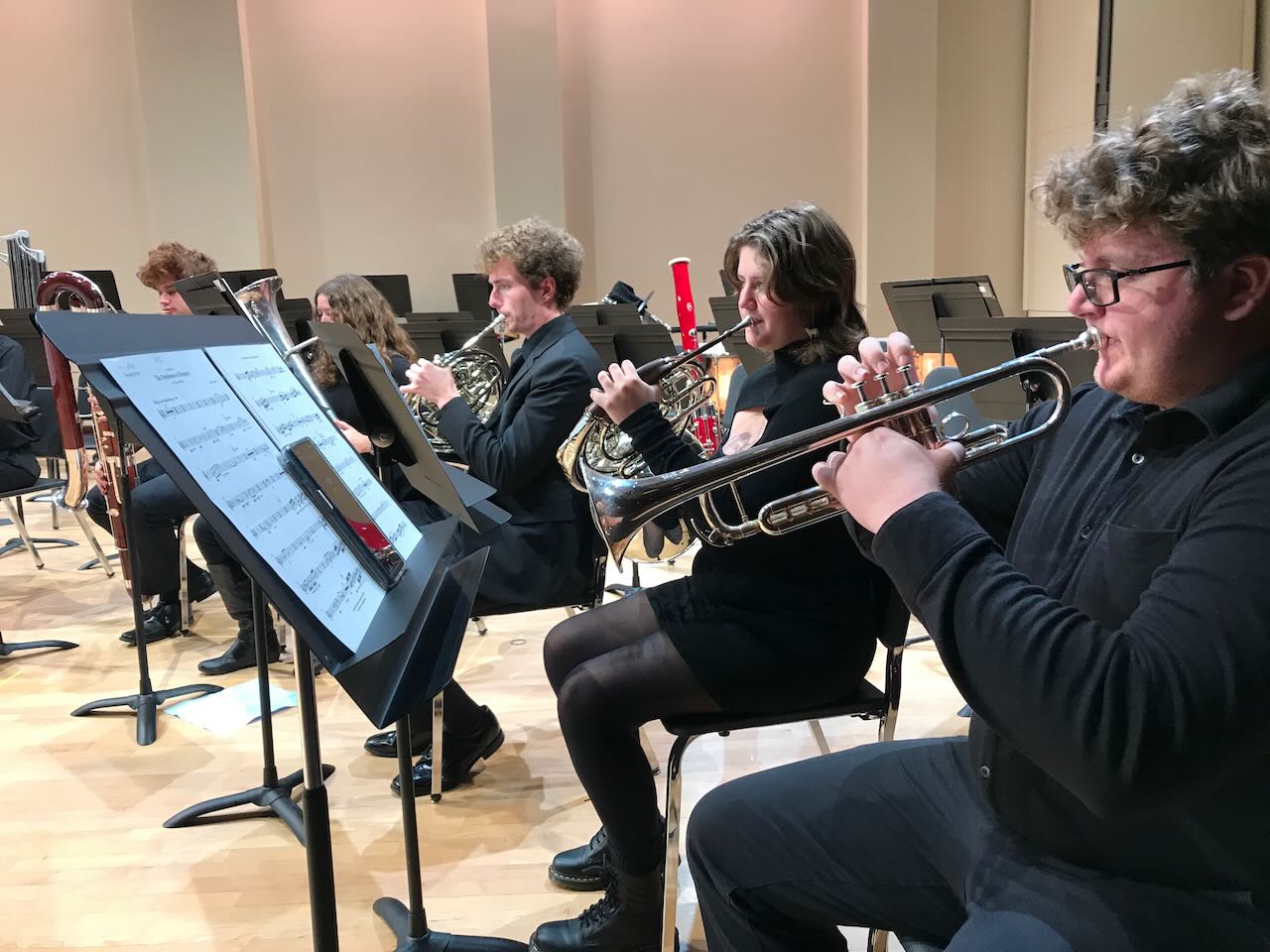All music ensembles at Cal Poly are offered as credit-bearing courses. These include Mustang Band, Jazz Bands, Wind Orchestra, Wind Ensemble, Chamber Ensembles and Combos. These classes meet in rehearsal from two to five hours per week. Directors describe current expecatations for each class on the syllabii. These are available on the course LMS (Canvas). Generally, speaking these areas of ensemble participation are assessed:
- Musical performance demonstrated in rehearsal, peridodic solo recordings, periodic section recordings and/or the culminating performance(s) throughout the academic term
- Prepararation at each rehearsal
- Attendance at full rehearsals, section rehearsals and performances.
Musical Improvement
Wind Orchestra, Wind Ensemble, & Mustang Band
Each ensemble member will be expected to show evidence of a satisfactory rate of musical progress and to play his or her assigned part acceptably. The musical grade, however, will be based on application and improvement rather than base playing ability. In addition, one should demonstrate the following to receive a musical grade of A:
- Individual practice on a regular basis
- Individual study/practice sessions with conductor (office hours)
- Attendance at section rehearsals
- Attendance at instrumental workshops presented by Music Department
- Attendance at concerts put on by our fellow ensembles and guest artists
Attitude & Cooperation
Musicians who have an attitude of contribution and a strong sense of responsibility and cooperation are a great asset to a musical organization. They possess a strong desire to perform at their best, a positive spirit and an enthusiasm to learn, work and contribute. They demonstrate maturity, dependability, honesty, friendliness, dedication and commitment to excellence. These students have a spirit of interest in, and responsibility and loyalty toward, the Mustang Band, Jazz Band and Wind Orchestra programs and their faculty and student administration. Students who have a strong sense of cooperation toward the realization of the best interests of the ensembles and the University will do the following:
- Develop a “servant’s heart”: I’m here to learn and to help. Sign up to serve on loading crews, publicity crews, etc. Assist the band officers and staff members on a volunteer basis to ensure that the band functions smoothly.
- Contribute to “band service” each quarter (Wind Orchestra and Wind Ensemble). This can include assisting a student band officer with such tasks as hauling equipment to the PAC, setting up the stage, putting up posters, etc. A band service is typically less than one hour; however, the time required varies. Students usually place sign-up sheets on the bulletin board several days prior to the completion of each task.
- Good manners serve the same purpose in a rehearsal (class) as they do anywhere else. Non-constructive rehearsal behavior includes (but is not limited to) the following: arriving late or leaving the rehearsal early, allowing your cell phone to disturb the class, texting, bringing your bicycle into the rehearsal room, leaving the room except when absolutely necessary, reading newspapers or books, doing homework, chatting with neighbors and packing up disruptively before the rehearsal is dismissed. It is important to practice exceptional behavior standards now so that it will come natural to you when you enter your profession and begin your career.
Attendance
 Ensemble members are expected to be in attendance at all rehearsals and performances. An absence from a rehearsal or performance is a very serious matter and should not occur without a valid reason. Attendance is maintained in fairness to all those who are regular and punctual in their commitment to the ensemble. Absences, tardiness, or early departures without a reasonable notification mars the efficiency of the entire organization, thereby affecting the genuine musical experience and enjoyment of the individual musician. The attendance system applies with equal force to all persons who are band members with or without credit.
Ensemble members are expected to be in attendance at all rehearsals and performances. An absence from a rehearsal or performance is a very serious matter and should not occur without a valid reason. Attendance is maintained in fairness to all those who are regular and punctual in their commitment to the ensemble. Absences, tardiness, or early departures without a reasonable notification mars the efficiency of the entire organization, thereby affecting the genuine musical experience and enjoyment of the individual musician. The attendance system applies with equal force to all persons who are band members with or without credit.
“If you are early, you are on time; if you are on time, you are late!” -- William V. Johnson, Cal Poly Director of Bands Emeritus
An unexcused absence from a performance or an unexcused tardiness to a performance may result in withdrawal and failure.
Special Note: Any unexcused tardy from a final rehearsal (prior to any performance) may result in the lowering of a grade by one letter.
Procedures
At the beginning of each quarter, and periodically throughout the quarter, ensemble members should determine if there are any conflicts with ensemble activities. If a conflict arises, it will be the responsibility of the musician to inform all of the conductors for that ensemble (by e-mail) as soon as possible, stating the reason for the proposed tardy or absence. The reasons for being tardy or absent are private matters between the conductors/directors and the ensemble member. It will be up to the conductors/directors to determine if the reason for being tardy or absent is valid. Therefore, students should explain, in detail, the reason for being tardy or absent thus providing the conductor/director with as much justification as possible. Students should pay special attention to dress rehearsals, sound checks and concerts.
Failure to notify the conductors/directors in advance of a tardy or absence may become the reason for not excusing an otherwise excusable request. If however, it becomes impossible to notify in advance, communication with the conductor/director must take place as soon as possible after the fact.

